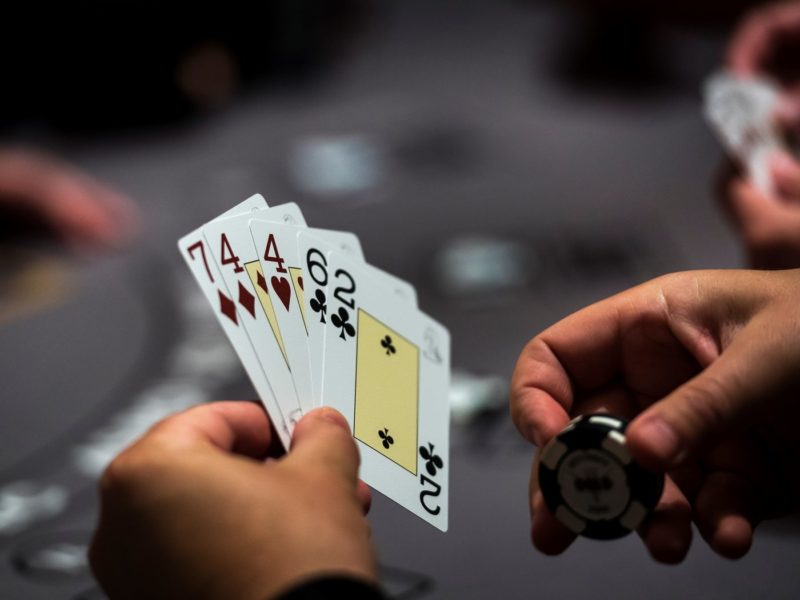Beginnings are always the hardest, this is certain. When starting an adventure with poker, players have often high expectations and little or no knowledge about the game strategies. Also, what is the most problematic, they are rarely humble. The desire to win and raise money in this seemingly easy game can beat a player before they even start to play.
Poker online is much fun and it’s constantly growing in popularity (read more here). Make sure you know the ins and outs of the game to avoid typical mistakes. We are listing them here to not only warn you before you head to play but, instead, to remind you how easily one can lose their head when sitting at a poker table and not thinking clearly.
1. Playing with each single hand

Many players, especially those who just make their first steps in the world of poker, tend to play every single hand. Well, this might happen for a few reasons. First of all, the excitement of being a part of the action can win over the reasonable thinking. Secondly, not wanting to give away a bad hand can be stronger. And then, sadly, doing everything to impress players at your table.
As the first two reasons are somehow self-explanatory and define the real, often harsh nature of poker and the game’s addicting adrenaline, the third point should be the first one to work on for every player. One should never start to play if their main goal is to wow other players. It is not only a distraction but, most importantly, a guaranteed way to lose the game. Poker is a social game and, as much as it is clear that no one wants to be seen as a loser, you will not want to end up a game as a pseudo hero with a couple of fewer zeros in your bank account either.
2. Ignoring maths
Okay, poker is not rocket size but it definitely does require you to understand basic maths. It is essential to know how to size bets and understand pot odds and implied pot odds. As you master this knowledge, your skills will improve significantly and you will get a better sense of when it is best to fold and when you should keep playing. We are not saying that you have to have a PhD in maths to be a successful player. No! But building your strategy around reasonable calculations can secure you better winnings and fewer losses.
Players often ignore the fundamentals of poker and want to skip the learning part to be immediately on top of the game. Impossible! Some people play the extremes by betting too much when the cards seem to be great or, the other way round – they
bet too little when the cards seem weak. The most ideal solution would be to not get oneself caught up in the emotions. It is necessary to analyse the given situation and learn how to make choices based on simple, mathematical facts. This can help one maximise potential winning and minimise the losses.
3. Refusing to give up

You do not have to be a poker player to hate losing. Everyone hates it. In poker, however, a good player knows when to step back and fold, instead of waiting for a magical, lucky strike. Novice players like to get caught up in waiting for cards in the flop. Unfortunately, poker runs on slightly different rules.
Let’s say a player has 3 cards that could help him get to a flush. Instead of thinking of the pot odds and probabilities, they will wait forever until two more cards appear in the flop to complete his flush. What are the chances of this happening? There is a probability it might never happen and, by then, the player might have wasted a nice chunk of money. Refusing to give up and is hard but the consequences of not doing so might be even harsher. Short-term emotions speed up our heart rate but also can empty our pockets faster…
4. Not knowing your opponents
You must never ignore the people you play with. But before we look into other players’ behaviour, let’s look into yours first. Have you ever wondered how your own habits can betray what cards you are holding? The way you play, react and behave while at the table – these are all the signs for your opponents.
For this exact reason, you should always study other players and their playing styles. Analyse their habits thoroughly. If you find it difficult to pick on their mental mistakes and you can’t find a pattern in their habits, consider playing against other opponents. Also, bear in mind, that every opponent is different. And a different human being means different habits, game strategies and mental tricks. Do not ever treat players the same way.
You still do not believe this is an essential part of poker? If not, then why some top world players hire FBI agent coaches to train them in recognising non-verbal communication?
5. Over-bluffing

Tricking an opponent is weirdly satisfying, right? Do it once or twice and it can quickly become an addiction. The problem with bluffing is particular, though. You will never know how successful you will be next time. The very disadvantage of bluffing is that your tricks will eventually terminate and your opponents will understand your tactic. In other words, the more you bluff using one strategy, the easier it will be for other players to solve the puzzle.
The reason behind bluffing is pretty obvious – the immediate profit you can gain on the successful bluffs. Every time you play with observant opponents, it is crucial to bluff every now and then to disorientate them and count on the action in the future when you have strong hands. So, we definitely do not discourage anyone from bluffing. All in all, it is a big part of poker! However, remember, this game is built upon much more than repetitive tricking so always balance your bluffs accordingly!
 Poker Players Alliance Casino & Gambling Articles 2024
Poker Players Alliance Casino & Gambling Articles 2024






